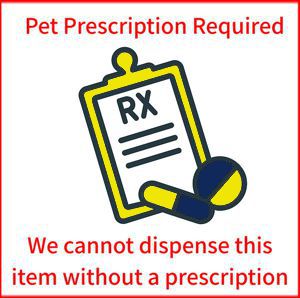
300mg Antirobe Capsule - per Capsule
238569
300mg Antirobe is an oral antibiotic for dogs.
Antirobe 300mg for Dogs contains clindamycin, an antibiotic that effectively combats a range of bacterial infections. Clindamycin works by inhibiting the growth of bacteria, preventing them from producing essential proteins vital for their survival. As a result, the bacteria cannot grow, reproduce, and spread, leading to their eventual elimination from the dog's system.
300mg Antirobe for Dogs is a broad-spectrum antibiotic, meaning it is effective against a wide variety of bacterial strains. This makes it a versatile choice for treating various infections.
VET PRESCRIPTION REQUIRED
Product Features
- Pack Size: - Sold Individually
- Target Animal: - Dogs and Cats
- Related Condition: - For the treatment of infected wounds and abscesses, and infected mouth cavity and dental infections and pyoderma
- Pet Prescription Required?: - Yes (For UK Orders)
- Active Ingredient: - Clindamycin
- Product Name: - 300mg Antirobe Capsule - per Capsule
More Information
Description
300mg Antirobe Tablets are an effective antibiotic against a wide range of bacterial infections, including those affecting the skin, mouth, and bones.
Antirobe may only be supplied with a valid veterinary prescription, issued by your vet. You should only purchase Antirobe if you have or are in the process of arranging such a prescription. See information bar for further details.
Each 300mg Antirobe capsule contains 300mg clindamycin (as clindamycin hydrochloride).
Antirobe is used as an oral antibiotic for dogs.
Dogs - Antirobe is used for the treatment of infected wounds and abscesses, and infected mouth cavity and dental infections, caused by or associated with Staphylococcus spp., Streptococcus spp. (except Streptococcus faecalis), Bacteroides spp., Fusobacterium necrophorum and Clostridium perfringens. To help provide antimicrobial cover during dental procedures. For the treatment of superficial pyoderma associated with Staphylococcus intermedius. For the treatment of osteomyelitis, caused by Staphylococcus aureus.
Cats - Antirobe is used for the treatment of infected wounds and abscesses and infected mouth cavity and dental infections, caused by bacteria sensitive to clindamycin. To help provide antimicrobial cover during dental procedures. Before Antirobe therapy is initiated, the involved pathogens should be identified and sensitivity to clindamycin established. Clindamycin has been shown to have in vitro activity against isolates of the following organisms: Aerobic Gram-positive cocci, including: Staphylococcus intermedius and Staphylococcus aureus (penicillinase and non-penicillinase producing strains), Staphylococcus epidermidis, Streptococcus spp. (except Streptococcus faecalis), Pneumococcus spp. Anaerobic Gram-negative bacilli, including: Bacteroides spp., Fusobacterium spp. Anaerobic Gram-positive non-spore-forming bacilli, including: Propionibacterium spp., Eubacterium spp., Actinomyces spp. Anaerobic and microaerophilic Gram-positive cocci, including: Peptococcus spp., Peptostreptococcus spp., microaerophilic streptococci. Clostridia: Most Cl.perfringens are susceptible; other species such as Cl. sporogenes and Cl. tertium frequently are resistant to clindamycin. Mycoplasma species: Most mycoplasma species are susceptible to clindamycin. Dosage and administration For oral administration only. 1.For the treatment of infected wounds and abscesses, and infected mouth cavity and dental infections in dogs and cats, administer either: -5.5 mg/kg of bodyweight every 12 hours for 7 to 10 days, or -11 mg/kg of bodyweight every 24 hours for 7 to 10 days If no clinical response is seen within 4 days, redetermine the diagnosis. To help provide anti-microbial cover during dental procedures, a 10 day course is recommended. This should be initiated five days before dental therapy and continued for five days thereafter. In dogs, treatment may be extended to a maximum of 28 days based on clinical judgement. 2.For the treatment of superficial pyoderma in dogs, administer either: -5.5 mg/kg of bodyweight every 12 hours -11 mg/kg of bodyweight every 24 hours Therapy of canine superficial pyoderma is usually recommended for 21 days, with extension of therapy based on clinical judgement. 3.For the treatment of osteomyelitis in dogs, administer: -11 mg/kg of bodyweight every 12 hours for a minimum of 28 days If no clinical response is seen within 14 days, the treatment should be stopped and the diagnosis redetermined. Dosage table Bodyweight Superficial pyoderma1, dental infections, wounds and abscesses, Osteomyelitis1 5.5 mg/kg ev. 12h 11 mg/kg ev. 24h 11 mg/kg ev. 12h 4.5 kg 1 x 25 mg twice daily 2 x 25 mg once daily 2 x 25 mg twice daily 13.5 kg 1 x 75 mg twice daily 1 x 150 mg once daily 1 x 150 mg twice daily 27.0 kg 1 x 150 mg twice daily 1 x 300 mg once daily 1 x 300 mg twice daily 1 dogs only
Legal category - Antirobe is a POM-V (Pet Prescription Required)
You may also like

150mg Antirobe Capsule - per Capsule
150mg Antirobe is an oral antibiotic for dogs and cats. VET PRESCRIPTION REQUIRED

25mg Antirobe Capsule - per Capsule
25mg Antirobe is an oral antibiotic for dogs and cats. VET PRESCRIPTION REQUIRED

75mg Antirobe Capsule - per Capsule
75mg Antirobe is an oral antibiotic for dogs and cats. VET PRESCRIPTION REQUIRED





